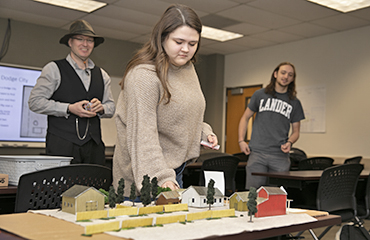
Studying the Second Siege of Ninety Six in the American Revolution? There’s a game for that.
Studying the Wild West or the struggle between the Axis and Allied powers during World War II? There are games for that, too.
The intense, hands-on activities exist because Dr. Franklin Rausch, a Lander University associate professor of history, has created and made use of a wide range of history-based simulation games for his students.
One of the games focuses on the 28-day battle from May 22 – June 18, 1781, between the Continental forces, led by Lt. Col. Nathanael Greene, and the British forces, under the command of Lt. Col. John H. Cruger. The British held the earthen fortification, today known as Star Fort, but were outnumbered by Greene’s troops. Intense fighting occurred, and the Continental forces retreated in the end.
In Rausch’s class, teams of two students each were given cards designating them as Greene or Cruger in the battle. A defined set of rules outlined the play of the game to determine the fighting power, successes and morale of the troops. The roll of dice gave students points for progressing in the game to determine which side would be victorious.
“The students study the battle and learn about the American Revolution,” Rausch said. “They have the chance to play the game and see if the battle could go differently. They become engaged in the battle and perhaps change the course of history.”
Another class studying American history took on the challenge of stealing gold in the “Wild West” town of Dodge City. For this game, Rausch, who created his own western outfit that included a pocket watch and western hat, built a table-top version of the famed cow town in Kansas.
Students chose metal figures as their personal characters and drew cards and rolled the dice to advance their steps in the town, find the gold, fight their way to safety and escape with the treasure or be mortally injured.
“The students find these experiences enjoyable. There’s some excitement in rolling the dice and finding out what you can do. The students are randomly selected for a group, and the games give them something to talk about. It’s a shared experience while we’re studying a particular topic,” he said.
The pieces of the games are stored in boxes in Rausch’s office, giving visitors the opportunity to get a brief glimpse of the intrigue awaiting the students.
“The games take a while to develop and build,” Rausch said, “but that investment is paid back.”

So far, Rausch has created more than a dozen history simulation games, which include one featuring Viking warriors and another looking at a person’s odds of surviving the Industrial Revolution.
That Rausch would involve his students in multi-dimensional history games is not a stretch to understand. In his life away from such scholarly pursuits as publishing books and articles in prestigious journals, serving on University committees and teaching undergraduate students, Rausch is a Revolutionary War re-enactor at Star Fort. In this capacity, he serves as the jailer at the National Park which offers tours and activities throughout the year. He also attends Revolutionary War historical events in South Carolina.
Rausch grew up in Indiana, where the Civil War experience was much different from the Palmetto State where he now lives. He enjoyed playing Dungeons and Dragons and loved storytelling, and he became interested in becoming a war re-enactor because a friend’s father was a Civil War re-enactor for the Union.
He also loved history as a student and turned that passion into a career. He earned his bachelor’s degree in Asian Studies and history and a master’s degree in Asian Studies, both at Indiana University, and his doctoral degree in Asian Studies at the University of British Columbia.
He joined Lander’s history faculty in 2012 and was promoted to associate professor in 2018. Then, in 2020, Rausch became involved with a new program at Lander. The University introduced a bachelor’s degree in history, with an emphasis in public history. The degree program prepares graduates for a wide array of career opportunities, including the management of museums, curating exhibits, working at historical sites, designing digital histories and documentaries, conducting archival research, as well as the collection and preservation of oral histories.
History-minded students can have the opportunity to share history beyond a classroom, Rausch said.
“We show them how they can reach a different audience and bring history to more people,” he said. “This is a type of public service that is valuable in many ways. The major is growing. Students are realizing that history can put them in the public and give them a different experience.”
Rausch predicts there will be more games in his future as a college professor and hopes the opportunity to share these experiences with faculty at other colleges and universities will grow. “All of us are looking for ways to engage our students so that they can share the excitement we have for history,” he said.
While the students participating in the Ninety Six game from the American Revolution didn’t change the outcome for the Continental Army, they did have the chance – at least during a class – to roll the dice and hold their breath in wonder for the outcome.